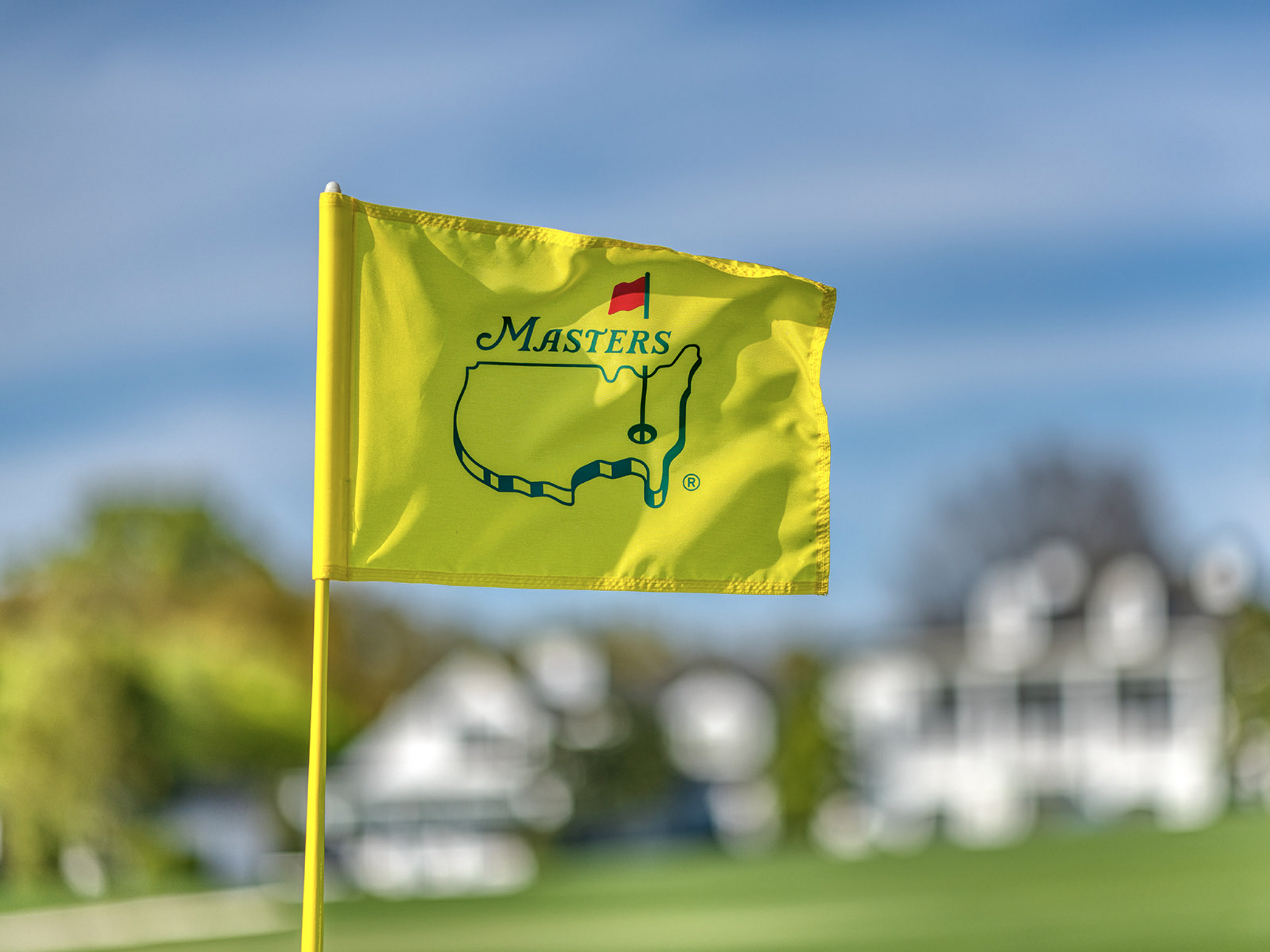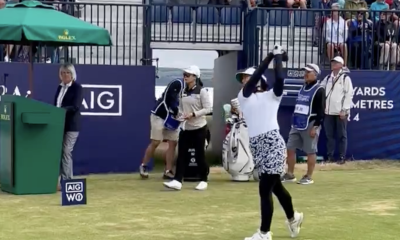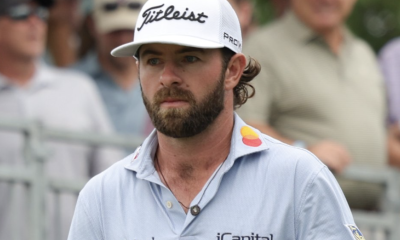Opinion & Analysis
The 22 players who can win the Masters

Each year for the Masters, I create a filtering process to help determine the players who are most likely to win the green jacket based on criteria that have strongly predictive outcomes at Augusta. I usually get the list down to roughly 20-25 players.
Last year, Hideki Matsuyama was one of my 21 players who could win the Masters. Matsuyama was at 45/1 odds. The top-5 in last year’s event consisted of three players that were shortlisted (Rahm, Leishman and Spieth). The other 2 players that finished in the top-5 were filtered out as Will Zalatoris was a first time invitee and Xander Schauffele was hitting the ball too low at the time of the event. In total 19 of the 23 players I shortlisted made the cut with 14 of the shortlisted players finishing in the top-25 and 6 “shortlisters” in the top-10.
The projected “critical holes” for the tournament are #8, #11, #13, and #15. The critical holes in any tournament are the ones where the top finishers typically gain the most strokes on the field, as well as where the greatest deviation in scores exist. One of the interesting aspects about critical holes is that they often change over time due to changes in the course conditions, course design or a change in player strategy, which can create a smaller deviation in scores.
The 15th hole, Firethorn, should be considered the most pivotal hole on the course as over the last five Masters the top finishers in the event have gained 0.414 strokes per round on the hole.
Moving on to the tournament, I filtered out the amateurs and all first-time professional attendees. The Masters has only been won once by a first-time attendee: Fuzzy Zoeller in 1979 and Gene Sarazen in the inaugural event
Sam Burns
Cameron Davis
Talor Gooch
Austin Greaser (a)
Stewart Hagestad (a)
Lucas Herbert
Garrick Higgo
Harry Higgs
Tom Hoge
Aaaron Jarvis (a)
Min Woo Lee
Guido Migliozzi
Keiti Nakajima (a)
James Piot (a)
Seamus Power
Laird Shepherd (a)
JJ Spaun
Sepp Straka
Harold Varner III
Out of the group of first-time invitees and amateurs I like Sam Burns, Tom Hoge, and Sepp Straka’s chances to get into contention.
I filter out old Masters champions that I do not believe can get into contention anymore.
Fred Couples
Bernhard Langer
Sandy Lyle
Larry Mize
Jose Maria Olazabal
Vijay Singh
Mike Weir
Next up, I filtered out those players that missed the cut at the Valero Texas Open last week. Recency has a strong predictive value for player performance and missing the cut in the event in the prior week greatly reduces the likelihood of winning the following week compared to players that miss the cut, take a week off, and then play the following week.
Cameron Champ
Bryson DeChambeau
Takumi Kanaya
K.H. Lee
Lee Westwood
And let’s filter out those players that have never made the cut at the Masters as outside of their inaugural event and Fuzzy Zoeller’s victory there has never been a winner who had not made the cut at the Masters prior to winning.
Max Homa
Hudson Swafford
Erik Van Rooyen
Matthew Wolff
The weather and the Zach Johnson debate
Every year I do my Masters picks, it’s always pointed out that I do not pick former Masters Champion Zach Johnson due to his lack of length off the tee. Augusta National greatly favors long-ball hitters. They can play the par 5s more like par 4s, and typically the longer hitters can also hit the ball higher so they can get their long approach shots to hold the green more easily.
When Johnson won the Masters in 2007, the event featured record-low temperatures in the mid-40s and wind gusts of 33 mph. This made it very hard for any player to reach the par 5s in two shots and allowed Johnson to get into a wedge contest on the par 5s, his strength.
The weather this week may give the shorter hitters a better chance. Former champion, Mike Weir, has said that he felt that the wet conditions helped him win the Green Jacket in 2003 because it allowed him to hold long approach shots onto the greens. And if the wind picks up, it may neutralize the advantage the long hitters have on the par-5’s.
This week’s weather is calling for rain on Tuesday and Wednesday, then the winds picking up on Thursday to 15 mph and 20+ mph on Friday. It will be cool (by Masters standards) on Saturday with a high of 60-degrees and winds forecasted at 17 mph.
When the winds pick up the short game around the green becomes more important because players are likely to hit fewer greens in regulation. But historically there has not been many strokes gained around the greens of Augusta due to the difficulty of the green surrounds. If the weather does play out as projected, it may favor players who are exceptional around the greens slightly, but will more likely eliminate poor performers around the greens from winning unless they have a legendary ballstriking performance.
Having said that, I still believe that it won’t be enough for short hitters to get into contention, so I filtered out these players
Abraham Ancer
Christiaan Bezudienhout
Matt Fitzpatrick
Brian Harman
Zach Johnson
Kevin Kisner
Kevin Na
Patrick Reed
Trajectory also has a strong predictive value in terms of winners. Simply put, there are not many low ball hitters (at the time of their victory) that won the Green Jacket and the better players of their era that were low ball hitters typically struggled at the Masters compared to other majors.
Last year I filtered out 14 players for hitting the ball too low and outside of Xander Schauffele (t-3rd finish) none of the players finished in the top-25. Furthermore, Schauffele was just narrowly filtered out for hitting the ball too low as I use a formula based on Apex Height, Launch Angle, Carry Distance and Spin Rate to filter out players for hitting the ball too low. I tweaked the formula a little after last year’s Masters and found that Schauffele would have made it thru the filter with the new formula.
Based on the new formula, the following players were filtered out for hitting it too low
Daniel Berger
Paul Casey
Corey Conners
Lucas Glover
Russell Henley
Si Woo Kim
Adam Scott
Jordan Spieth
Danny Willett
Spieth’s newfound low trajectory was surprising to me, but not as much as Adam Scott who is well known for traditionally being a high ball player. Out of the group I do like Russell Henley’s chances as well as he’s a great iron player and he currently ranks 27th in Strokes Gained – Around the Green and that may be helpful if the winds greatly impact play this week.
When people think about Augusta National they think of the greens and the crazy speeds and putts the competitors can have. However they mistakenly think that the winner is always decided by the putter. 12 of the last 13 winners have hit at least 49 greens in regulation and shots from 175-225 yards are where most of the strokes are gained and lost at the Masters.
Therefore the following players were filtered out for their performance this season from 175-225 yards
Patrick Cantlay
Stewart Cink
Sergio Garcia
Padraig Harrington
Billy Horschel
Mackenzie Hughes
Marc Leishman
Rory McIlroy
Francesco Molinari
Louis Oosthuizen
Thomas Pieters
Justin Rose
Charl Schwartzel
Gary Woodland
Cameron Young
I made a specific point to filter out Rory McIlroy here instead of filtering him out for missing the cut at the Valero Texas Open as McIlroy has uncharacteristically struggled this season from 175-225 yards. He currently ranks 172nd out of 210 players from 175-225 yards.
Oosthuizen, Leishman, and Rose were narrowly filtered out for their performance from 175-225 yards.
I also filtered out two former Masters champions
Bubba Watson
Tiger Woods
Watson has barely played enough to derive any meaningful analysis from and Tiger hasn’t played in nearly 18 months coming off a horrific car wreck and we still don’t know if he is going to play. Anything could happen, but I think the likelihood is very low that either will win the Green Jacket.
That leaves us with 22 players that can win the Masters
Tony Finau (66/1)
Tommy Fleetwood (80/1)
Tyrrell Hatton (66/1)
Viktor Hovland (20/1)
Sungjae Im (66/1)
Dustin Johnson (16/1)
Brooks Koepka (18/1)
Jason Kokrak (100/1)
Luke List (150/1)
Shane Lowry (50/1)
Robert MacIntyre (125/1)
Hideki Matsuyama (40/1)
Collin Morikawa (18/1)
Joaquin Niemann (50/1)
Ryan Palmer (150/1)
Jon Rahm (12/1)
Xander Schauffele (25/1)
Scottie Scheffler (14/1)
Webb Simpson (150/1)
Cameron Smith (14/1)
Justin Thomas (12/1)
Will Zalatoris (33/1)
My top-10 picks are
Brooks Koepka, (18/1)
Shane Lowry (50/1)
Robert MacIntyre (125/1)
Collin Morikawa (18/1)
Joaquin Niemann (50/1)
Jon Rahm (12/1)
Scottie Scheffler (14/1)
Cameron Smith (14/1)
Justin Thomas (12/1)
Will Zalatoris (33/1)
Opinion & Analysis
The 2 primary challenges golf equipment companies face

As the editor-in-chief of this website and an observer of the GolfWRX forums and other online golf equipment discourse for over a decade, I’m pretty well attuned to the grunts and grumbles of a significant portion of the golf equipment purchasing spectrum. And before you accuse me of lording above all in some digital ivory tower, I’d like to offer that I worked at golf courses (public and private) for years prior to picking up my pen, so I’m well-versed in the non-degenerate golf equipment consumers out there. I touched (green)grass (retail)!
Complaints about the ills of and related to the OEMs usually follow some version of: Product cycles are too short for real innovation, tour equipment isn’t the same as retail (which is largely not true, by the way), too much is invested in marketing and not enough in R&D, top staffer X hasn’t even put the new driver in play, so it’s obviously not superior to the previous generation, prices are too high, and on and on.
Without digging into the merits of any of these claims, which I believe are mostly red herrings, I’d like to bring into view of our rangefinder what I believe to be the two primary difficulties golf equipment companies face.
One: As Terry Koehler, back when he was the CEO of Ben Hogan, told me at the time of the Ft Worth irons launch, if you can’t regularly hit the golf ball in a coin-sized area in the middle of the face, there’s not a ton that iron technology can do for you. Now, this is less true now with respect to irons than when he said it, and is less and less true by degrees as the clubs get larger (utilities, fairways, hybrids, drivers), but there remains a great deal of golf equipment truth in that statement. Think about it — which is to say, in TL;DR fashion, get lessons from a qualified instructor who will teach you about the fundamentals of repeatable impact and how the golf swing works, not just offer band-aid fixes. If you can’t repeatably deliver the golf club to the golf ball in something resembling the manner it was designed for, how can you expect to be getting the most out of the club — put another way, the maximum value from your investment?
Similarly, game improvement equipment can only improve your game if you game it. In other words, get fit for the clubs you ought to be playing rather than filling the bag with the ones you wish you could hit or used to be able to hit. Of course, don’t do this if you don’t care about performance and just want to hit a forged blade while playing off an 18 handicap. That’s absolutely fine. There were plenty of members in clubs back in the day playing Hogan Apex or Mizuno MP-32 irons who had no business doing so from a ballstriking standpoint, but they enjoyed their look, feel, and complementary qualities to their Gatsby hats and cashmere sweaters. Do what brings you a measure of joy in this maddening game.
Now, the second issue. This is not a plea for non-conforming equipment; rather, it is a statement of fact. USGA/R&A limits on every facet of golf equipment are detrimental to golf equipment manufacturers. Sure, you know this, but do you think about it as it applies to almost every element of equipment? A 500cc driver would be inherently more forgiving than a 460cc, as one with a COR measurement in excess of 0.83. 50-inch shafts. Box grooves. And on and on.
Would fewer regulations be objectively bad for the game? Would this erode its soul? Fortunately, that’s beside the point of this exercise, which is merely to point out the facts. The fact, in this case, is that equipment restrictions and regulations are the slaughterbench of an abundance of innovation in the golf equipment space. Is this for the best? Well, now I’ve asked the question twice and might as well give a partial response, I guess my answer to that would be, “It depends on what type of golf you’re playing and who you’re playing it with.”
For my part, I don’t mind embarrassing myself with vintage blades and persimmons chasing after the quasi-spiritual elevation of a well-struck shot, but that’s just me. Plenty of folks don’t give a damn if their grooves are conforming. Plenty of folks think the folks in Liberty Corner ought to add a prison to the museum for such offences. And those are just a few of the considerations for the amateur game — which doesn’t get inside the gallery ropes of the pro game…
Different strokes in the game of golf, in my humble opinion.
Anyway, I believe equipment company engineers are genuinely trying to build better equipment year over year. The marketing departments are trying to find ways to make this equipment appeal to the broadest segment of the golf market possible. All of this against (1) the backdrop of — at least for now — firm product cycles. And golfers who, with their ~15 average handicap (men), for the most part, are not striping the golf ball like Tiger in his prime and seem to have less and less time year over year to practice and improve. (2) Regulations that massively restrict what they’re able to do…
That’s the landscape as I see it and the real headwinds for golf equipment companies. No doubt, there’s more I haven’t considered, but I think the previous is a better — and better faith — point of departure when formulating any serious commentary on the golf equipment world than some of the more cynical and conspiratorial takes I hear.
Agree? Disagree? Think I’m worthy of an Adam Hadwin-esque security guard tackle? Let me know in the comments.
@golfoncbs The infamous Adam Hadwin tackle ? #golf #fyp #canada #pgatour #adamhadwin ? Ghibli-style nostalgic waltz – MaSssuguMusic
Podcasts
Fore Love of Golf: Introducing a new club concept

Episode #16 brings us Cliff McKinney. Cliff is the founder of Old Charlie Golf Club, a new club, and concept, to be built in the Florida panhandle. The model is quite interesting and aims to make great, private golf more affordable. We hope you enjoy the show!
Opinion & Analysis
On Scottie Scheffler wondering ‘What’s the point of winning?’

Last week, I came across a reel from BBC Sport on Instagram featuring Scottie Scheffler speaking to the media ahead of The Open at Royal Portrush. In it, he shared that he often wonders what the point is of wanting to win tournaments so badly — especially when he knows, deep down, that it doesn’t lead to a truly fulfilling life.
View this post on Instagram
“Is it great to be able to win tournaments and to accomplish the things I have in the game of golf? Yeah, it brings tears to my eyes just to think about it because I’ve literally worked my entire life to be good at this sport,” Scheffler said. “To have that kind of sense of accomplishment, I think, is a pretty cool feeling. To get to live out your dreams is very special, but at the end of the day, I’m not out here to inspire the next generation of golfers. I’m not out here to inspire someone to be the best player in the world, because what’s the point?”
Ironically — or perhaps perfectly — he went on to win the claret jug.
That question — what’s the point of winning? — cuts straight to the heart of the human journey.
As someone who’s spent over two decades in the trenches of professional golf, and in deep study of the mental, emotional, and spiritual dimensions of the game, I see Scottie’s inner conflict as a sign of soul evolution in motion.
I came to golf late. I wasn’t a junior standout or college All-American. At 27, I left a steady corporate job to see if I could be on the PGA Tour starting as a 14-handicap, average-length hitter. Over the years, my journey has been defined less by trophies and more by the relentless effort to navigate the deeply inequitable and gated system of professional golf — an effort that ultimately turned inward and helped me evolve as both a golfer and a person.
One perspective that helped me make sense of this inner dissonance around competition and our culture’s tendency to overvalue winning is the idea of soul evolution.
The University of Virginia’s Division of Perceptual Studies has done extensive research on reincarnation, and Netflix’s Surviving Death (Episode 6) explores the topic, too. Whether you take it literally or metaphorically, the idea that we’re on a long arc of growth — from beginner to sage elder — offers a profound perspective.
If you accept the premise literally, then terms like “young soul” and “old soul” start to hold meaning. However, even if we set the word “soul” aside, it’s easy to see that different levels of life experience produce different worldviews.
Newer souls — or people in earlier stages of their development — may be curious and kind but still lack discernment or depth. There is a naivety, and they don’t yet question as deeply, tending to see things in black and white, partly because certainty feels safer than confronting the unknown.
As we gain more experience, we begin to experiment. We test limits. We chase extreme external goals — sometimes at the expense of health, relationships, or inner peace — still operating from hunger, ambition, and the fragility of the ego.
It’s a necessary stage, but often a turbulent and unfulfilling one.
David Duval fell off the map after reaching World No. 1. Bubba Watson had his own “Is this it?” moment with his caddie, Ted Scott, after winning the Masters.
In Aaron Rodgers: Enigma, reflecting on his 2011 Super Bowl win, Rodgers said:
“Now I’ve accomplished the only thing that I really, really wanted to do in my life. Now what? I was like, ‘Did I aim at the wrong thing? Did I spend too much time thinking about stuff that ultimately doesn’t give you true happiness?’”
Jim Carrey once said, “I think everybody should get rich and famous and do everything they ever dreamed of so they can see that it’s not the answer.”
Eventually, though, something shifts.
We begin to see in shades of gray. Winning, dominating, accumulating—these pursuits lose their shine. The rewards feel more fleeting. Living in a constant state of fight-or-flight makes us feel alive, yes, but not happy and joyful.
Compassion begins to replace ambition. Love, presence, and gratitude become more fulfilling than status, profits, or trophies. We crave balance over burnout. Collaboration over competition. Meaning over metrics.
Interestingly, if we zoom out, we can apply this same model to nations and cultures. Countries, like people, have a collective “soul stage” made up of the individuals within them.
Take the United States, for example. I’d place it as a mid-level soul: highly competitive and deeply driven, but still learning emotional maturity. Still uncomfortable with nuance. Still believing that more is always better. Despite its global wins, the U.S. currently ranks just 23rd in happiness (as of 2025). You might liken it to a gifted teenager—bold, eager, and ambitious, but angsty and still figuring out how to live well and in balance. As much as a parent wants to protect their child, sometimes the child has to make their own mistakes to truly grow.
So when Scottie Scheffler wonders what the point of winning is, I don’t see someone losing strength.
I see someone evolving.
He’s beginning to look beyond the leaderboard. Beyond metrics of success that carry a lower vibration. And yet, in a poetic twist, Scheffler did go on to win The Open. But that only reinforces the point: even at the pinnacle, the question remains. And if more of us in the golf and sports world — and in U.S. culture at large — started asking similar questions, we might discover that the more meaningful trophy isn’t about accumulating or beating others at all costs.
It’s about awakening and evolving to something more than winning could ever promise.




















Tony P
Apr 11, 2022 at 3:26 pm
Man your picks were so solid. Used your list as a guide for my masters pool and crushed it. Nice work!!
Jim
Apr 10, 2022 at 10:14 pm
Nice work! Won my Master’s pool with your list. Keeping this one to myself around those guys!
Justin Oliver
Apr 10, 2022 at 6:56 pm
You won me my masters pool with this article man it was brilliant
John Garcia
Apr 9, 2022 at 1:24 am
I thought I’d check this out after the cut Friday evening. 19 of your 22 made the cut, only Koepka, List, and R. Palmer didn’t make it. 9 of your top 10 made the cut, Koepka being the lone miss. You have the leader, 4 of the top 5, and 10 of the top 15. Amazing. I hope to see more of these!!
Taz
Apr 7, 2022 at 8:44 pm
Great article with lots of detail and insight. How come you don’t have DJ as a top 10 but have Zallatoris? DJ has the long ball, short game and putter compared to Will. To top it, DJ has won before.
Richie Hunt
Apr 8, 2022 at 11:52 am
DJ hasn’t played a lot recently and had some issues from 150-175 yards. 150-175 yards isn’t a major filter, but when I get down to the top-10 I factor that in a little more. Having said that, DJ has usually been a very good wind player.
HR Fernández
Apr 7, 2022 at 12:12 am
This is the best article I have read in GWRX in a long time, hands down.
Excellent analysis!
CT Gonza'''''''''''''''''''''''''''''lez
Apr 13, 2022 at 1:48 pm
if thats true^, then you are extremely unintelligent… thanks for showing your ignorance yet again Senora Ferna”””””””””””””””””””””””””’ndez!!!!!!!!!!!
Rk
Apr 6, 2022 at 9:52 pm
Best article on WRX year in and year out
Alex Laflamme
Apr 6, 2022 at 2:29 pm
Really interesting process. Thanks for sharing!
reeder
Apr 6, 2022 at 12:34 pm
Interesting article describing how you narrowed down your list to a final 22/10. I would agree with many of your picks. Thanks for compiling the list and writing the article.
Krip
Apr 6, 2022 at 11:28 am
Zalatoris was a tough exclusion in my selection. He can’t put.
Gdb99
Apr 6, 2022 at 1:11 pm
Can’t putt either.
Not Andrew Eisner
Apr 6, 2022 at 8:43 am
Rich, I always enjoy this column. I would love to know YOUR GUY, though. Which guy passes through all the filters and feels like the guy with the best chance to take it home?
William Bryngnäs
Apr 6, 2022 at 6:55 am
You filter out ”Low traj players” but then you still end up with Fleetwood, McIntyre, Lowry & Niemann?
Horton
Apr 5, 2022 at 4:26 pm
The Masters has only been won once by a first-time attendee: Fuzzy Zoeller in 1979 and Gene Sarazen in the inaugural event
Horton Smith says you might want to check your facts…..Gene thinks you for the additional major…
Adams
Apr 6, 2022 at 10:17 pm
Not sure I would trust a Masters researcher who thinks Sarazen won the first masters. Can’t understand why Arnold Palmer isn’t on his short list…
Mark
Apr 5, 2022 at 1:30 pm
I’m surprised that Koepka is a top 10 pick for you considering he didn’t make the cut last year. What’s your reasoning behind that pick?
Not Rich Hunt
Apr 5, 2022 at 2:29 pm
He was hurt last year when he missed the cut.
Ron
Apr 5, 2022 at 4:27 pm
He’s a **** spouting off movie lines and assaulting people holding phones this year and deserves to miss the cut.
Rich Hunt
Apr 5, 2022 at 5:09 pm
It was last year. Things change. He passed thru each of the filters easily and has played well in the Masters before.